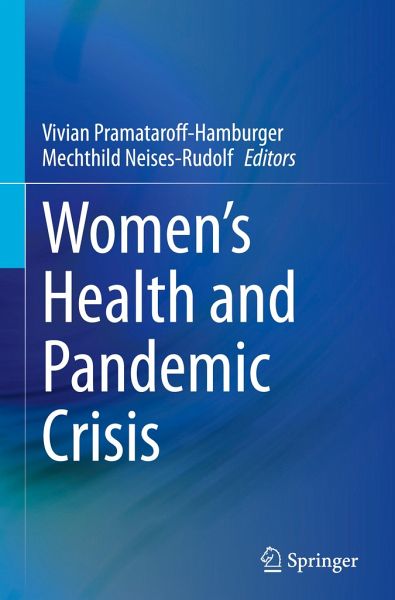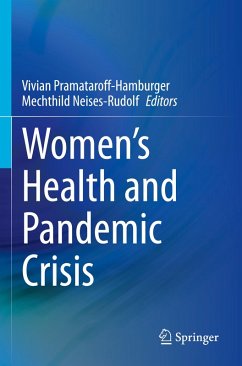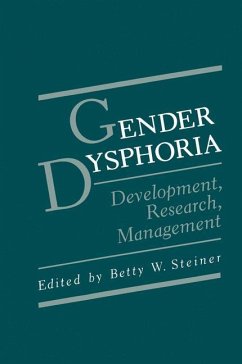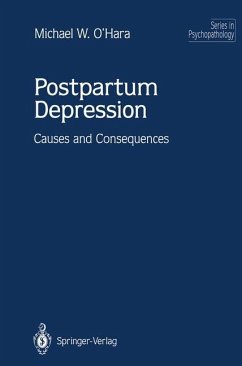
Women's Health and Pandemic Crisis

PAYBACK Punkte
57 °P sammeln!
This book focuses on the unique challenges for women in a pandemic situation, both as caretakers and patients. It has been noted that in the last two years medical doctors, psychologists, and health workers have seen a huge impact of the pandemic experience on women and their families. Children and adolescents suffered from a strong reduction of social contacts, while families had often to resort to cramped living condition that put a strain on normal life activities, especially in underprivileged areas of society. Fear and uncertainty reigned. All these factors caused a wide range of psychoso...
This book focuses on the unique challenges for women in a pandemic situation, both as caretakers and patients. It has been noted that in the last two years medical doctors, psychologists, and health workers have seen a huge impact of the pandemic experience on women and their families. Children and adolescents suffered from a strong reduction of social contacts, while families had often to resort to cramped living condition that put a strain on normal life activities, especially in underprivileged areas of society. Fear and uncertainty reigned. All these factors caused a wide range of psychosocial symptoms, from loneliness to domestic violence, depression, and psychosomatic reactions.
As health professionals, women have been influenced by the pandemic experience as well. Hospital staff, who had to care for a huge number of seriously ill patients in a very short time, were confronted with considerable expectations, which often turned into hostility, especially in the period before vaccinations became available. Psychotherapists received increased requests for appointments and had to adjust to video consultation for those they were able to accommodate in their practice.
Seeing the pandemic crisis as an opportunity to learn from mistakes, and lack of preparation, fostering a greater understanding of women's health in general, and the unique experiences of pregnancy, childbirth, trauma, adolescence, body experience, and gender identity that affects their health. This book gathers our current state of knowledge about women in the extreme situation of a pandemic crisis and points the way to an improved level of care for the future.
"This timely view of women's mental health in pandemics provides a vision to the path we must all take now to assist women in some of the most important elements of preventive care: their mental and emotional well-being ... [T]his book emphasizes that the mental health of a mother must be considered in allcircumstances. Well done for being the conscience we need!"
- Jeanne Ann Conry, MD, PhD, President, The International Federation of Gynecology and Obstetrics, Past President, The American College of Obstetricians and Gynecologists, Immediate Past Chair, The Women's Preventive Health Initiative (WPSI)
As health professionals, women have been influenced by the pandemic experience as well. Hospital staff, who had to care for a huge number of seriously ill patients in a very short time, were confronted with considerable expectations, which often turned into hostility, especially in the period before vaccinations became available. Psychotherapists received increased requests for appointments and had to adjust to video consultation for those they were able to accommodate in their practice.
Seeing the pandemic crisis as an opportunity to learn from mistakes, and lack of preparation, fostering a greater understanding of women's health in general, and the unique experiences of pregnancy, childbirth, trauma, adolescence, body experience, and gender identity that affects their health. This book gathers our current state of knowledge about women in the extreme situation of a pandemic crisis and points the way to an improved level of care for the future.
"This timely view of women's mental health in pandemics provides a vision to the path we must all take now to assist women in some of the most important elements of preventive care: their mental and emotional well-being ... [T]his book emphasizes that the mental health of a mother must be considered in allcircumstances. Well done for being the conscience we need!"
- Jeanne Ann Conry, MD, PhD, President, The International Federation of Gynecology and Obstetrics, Past President, The American College of Obstetricians and Gynecologists, Immediate Past Chair, The Women's Preventive Health Initiative (WPSI)














